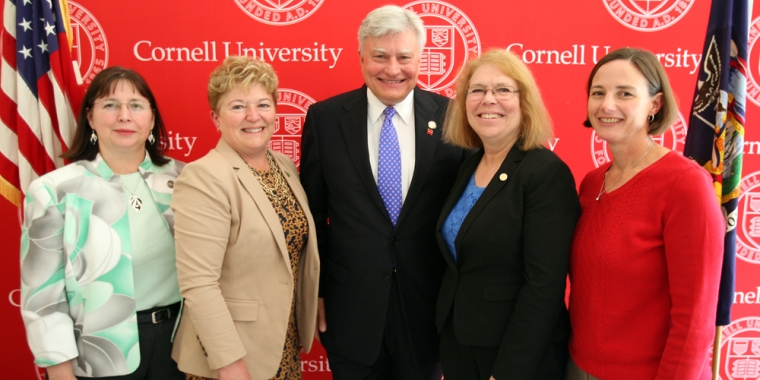
Senator Nozzolio Unveils “Planting Seeds” Initiative
Michael F. Nozzolio
February 11, 2016

New York State Senator Mike Nozzolio and his colleagues in the Senate Republican Conference unveiled their 2016 “Planting Seeds” legislative plan earlier this week, which continues to support the hardworking men and women of New York’s agriculture industry. Planting Seeds includes proposals to help ensure that agriculture, the Finger Lakes Region’s leading industry, continues to grow.
“Agriculture is the backbone of our economy, particularly in the Finger Lakes Region,” said Senator Nozzolio. “At a time when farms are struggling, we need to do everything possible to support our Upstate farmers so they remain viable food and job producers in our region and across the state.”
The new Planting Seeds initiatives would: restore cuts to agriculture funding, reduce taxes on farming families, increase state funding for Cornell’s College of Agriculture and Life Sciences, and provide new funding for an innovative proposal by Cornell’s Small Farms Program to help establish up to five veteran-owned small farms through a first-in-the-nation pilot program.
Planting Seeds’ initiatives also include:
Restoring Funding Cuts
- Since 2011, Senate Republicans have succeeded in restoring more than $32 million in budget cuts for agriculture funding. The 2016-17 Executive Budget proposes to cut funding for 42 different programs in the largest single-year reduction in agriculture funding in five years. Senator Nozzolio will prioritize full restoration of these cuts, and work to achieve record levels of funding to support the Finger Lakes region’s agriculture industry.
Strengthening Farmers’ Bottom Lines
- Estate Tax Reform – speed up the full phase-in of the estate tax reform; and
- Farmer Personal Income Tax (PIT) Exemption – reduce taxes on family farmers by raising the PIT exemption for small and mid-sized family farms from the current 5 percent to 20 percent, and making even more farmers eligible for the exemption.
Supporting Research
- Restore cuts to Cornell University’s important agriculture-related research and study programs to keep it as the nation’s premier center for agricultural learning and research; and
- Increase state funding for Cornell’s College of Agriculture and Life Sciences to meet the growing demand from students for agriculture and veterinary instruction programs. Increasing support for these education programs will help hold the line on rising college costs and student debt.
Protecting Food and Human Health
- Support programs that aim to detect and prevent the spread of diseases in plants and animals. Additional funding would expand Cornell’s research into the recent honeybee die-off, which is critical to crop pollination, and expand programs that encourage farmers to reduce pesticide use;
- Support the replacement of aging and outdated lab facilities. State funds would help leverage additional USDA support for a new lab to continue Cornell’s cutting-edge food safety and research programs; and
- Increase funding to efforts that stop the spread of wildlife rabies from Canada and across New York State, and to provide reimbursement to local public health services for costly human post-exposure rabies preventive treatments.
Encouraging Innovation
- Restore budget funding for a third round of Beginning Farmer grants to encourage interest in agriculture and help protect the future of family farming. A second round of grants will be announced in the near future to help even more new businesses grow;
- Provide new funding for established farmers to help them install innovative new technology to make their farms more efficient and profitable;
- Increase funding for local cooperative extensions, which are often the first point of contact for experienced and beginning farmers in finding solutions to problems and challenges on the farm;
- Increase investment in FarmNet, which provides services and assistance to farmers, including business and farm transition planning; and
- Help dairy farmers who are dealing with price volatility by increasing funding for programs that help find ways to improve profits.
Supporting Agriculture Education
- Extend the Beginning Farmer Student Loan Forgiveness Program to include students who are pursuing degrees in agriculture education. The program was a part of the Senate’s 2014 Young Farmers Initiative to provide loan forgiveness for beginning farmers to encourage more young people to consider careers in agriculture;
- Continued support for the high-school based FFA programs (formerly known as “Future Farmers of America”);
- Establish an agriculture management program at SUNY’s Canton College, which can serve as a lower-cost alternative to four-year agriculture degree programs.
Assisting our Veterans
- New funding for an innovative proposal by Cornell’s Small Farms Program to help establish up to five veteran-owned small farms through a first-in-the-nation pilot program. Returning veterans and those seeking a career change could be encouraged to try agriculture, utilizing benefits they have earned under the GI Bill to gain training and expertise to begin their own successful small business. In turn, these sites would be available to train additional veteran-farmers in future years.


